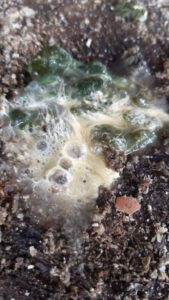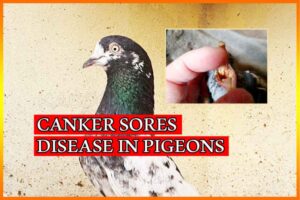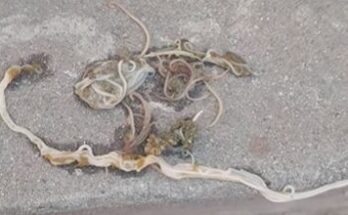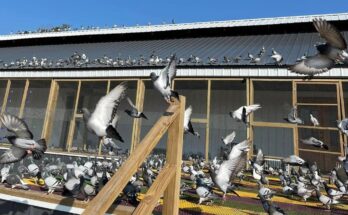Pigeons Paramyxovirus Virus – The paramyxovirus is related to the Newcastle disease pathogen, but not identical. The virus is highly pathogenic for pigeons, but not for other domestic bird species.
Within just a few days of infection, both visibly and latently affected birds shed the virus in secretions from the conjunctiva, nose and throat, as well as in the faeces. The incubation period ranges from 3 to 21 days. Up to 30% of affected pigeons may recover spontaneously after around 4 weeks of illness.

Pigeons Paramyxovirus Virus -Clinical Signs of Infected Pigeon
PPMV1 is a contagious viral disease which typically affects high numbers of pigeons within a loft.

Clinical signs can be seen as early as 5 days after picking up the virus, or as long as 6 weeks after acquiring infection. The birds drink more than normal and produce watery green faeces consisting of pool of clear urine surrounding a core of green material.
Early Signs
- reluctance to fly
- lethargy
- ruffled feathers
- increased thirst
- loss of appetite
- quietness
After 48 Hours
- vomiting
- diarrhoea
- difficulty breathing
- neurological signs including trembling of the wings and head, tumbling on landing, paralysis of the wings and legs and twisting of the neck and even death

Spread of Paramyxovirus in Pigeons
PPMV1 spreads easily between pigeons. During this time infected birds excrete the virus through their faeces, as well as other bodily discharges. Other birds become infected through direct contact with an infected bird, or contamination of the environment, feed, water, equipment and human clothing. The virus may remain infectious in the environment for several weeks. The disease can be introduced to a loft of kept pigeons through contact with wild pigeons.
How To Prevent Pigeons from Newcastle Disease ?
Pigeon owners are responsible for preventing PPMV1 in their flocks. Prevention can be achieved through vaccination and sound biosecurity practices.
- quarantine new birds before introducing them to the existing flock
- feed and clean quarantined birds after the other birds
- prevent contamination of food and water by droppings
- buy birds from a breeder with a known bird health status
- buy healthy-looking birds and avoid buying them from markets
- disinfect equipment used to house, transport or feed or water birds from outside your flock or birds that have travelled to shows
- restrict contact between pet birds and wild birds
Feeding and Watering the Infected Birds
Place seed in a deep dish so that if they stab at random they can pick seed up. Because Pigeon PMV can cause fits pigeons are at risk of drowning but they need free access to water. Provide water (with added electrolytes if possible) in a deep narrow container to minimize the risk of accidental drowning.
Hand feeding may be necessary. If feeding by gavage tube is not an option the pigeon’s mouth has to be opened and the food pushed to the back of throat. The perfect diet is to give black chickpeas (soaked in water for 6 hours), and let the pigeon drink the same water.
Weigh the pigeon daily and carry out a poop count to ensure that he is getting enough food. As a guideline, a healthy pigeon will pass between 20 and 30 raisin sized poops a day.
Additional Treatment for Infected Birds
The disease runs its course in about 6 weeks, by that time the pigeon has stopped shedding the virus and won’t infect other pigeons but nervous symptoms and gastro-intestinal may persist longer. Always give vitamins to boost the immune system. A good Sun-light 4-5 hours each day is very important for your infected birds. Using of probiotics helps to crowd out any bad gut bacteria. Electrolytes can be given to replace the electrolytes lost through polyuria.
I have found that providing a calcium supplement on arrival (Gem Calcium Syrup with Vitamin D3) has helped. The dose I gave was two drops a day for 3 days. Do not use antibiotics without consulting a vet. They can intensify the lesions and aggravate the course of the disease.
For Pet Accessories & Bird Supplies – Visit I Favor Pet
RATE ARTICLE
- Best Quality Pigeons Sign to Notice

- Best Racing Pigeon Eyes Hidden Secret Revealed

- Canker Sore Treatment in Pigeons

- Coccidiosis In Pigeons – How To Treat Cocci Disease

- Diarrhea in Pigeons Big Problem for Fanciers

- Digestion Issues in Pigeons Not To Worry Now









